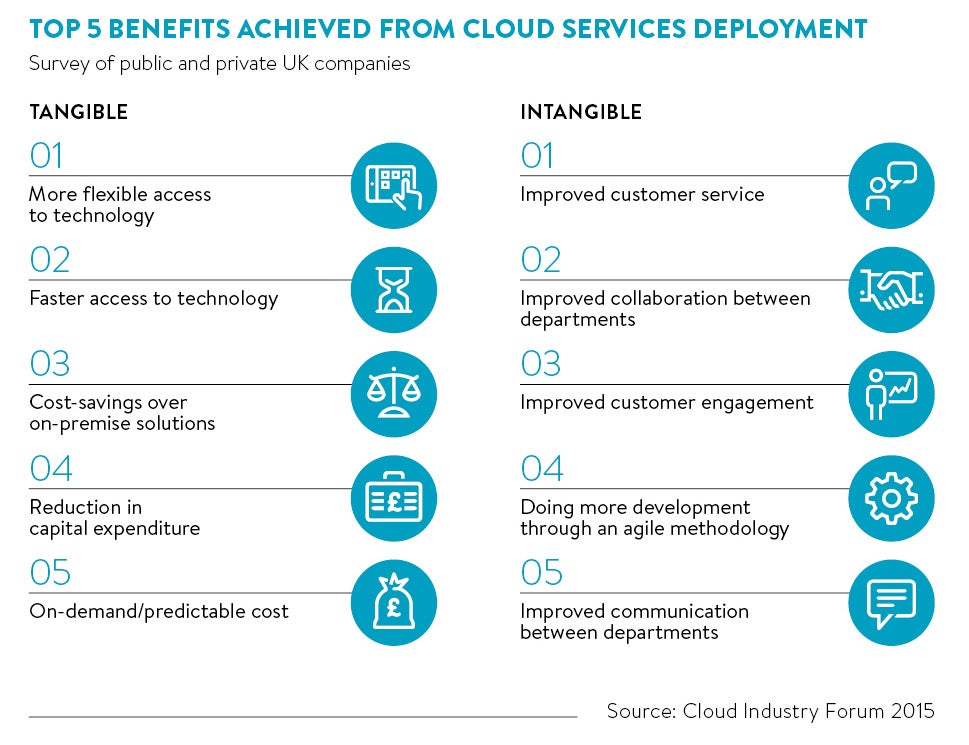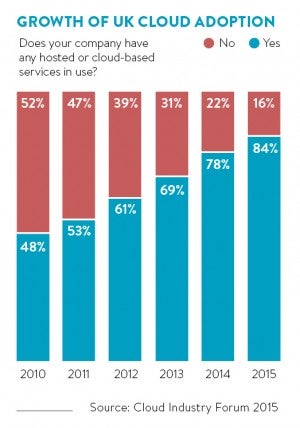The cloud is the infrastructure in cyberspace from which a new digital landscape is being shaped. Advances in exciting, emergent innovations, such as the internet of things and machine-learning, are being driven forward by this ubiquitous internet technology which promotes speed and collaboration.
In a cosmic blink of an eye it has transformed the world of work and the structure of business, literally causing organisations to reshape everything they do from how and who they recruit, to the energy and resources they commit to simple operations.
“The cloud’s scalability, flexibility and ubiquity helps companies cope with the internal and external pressures that come with growing into new markets or launching new products and services,” explains Len Padilla, vice president of product strategy at NTT Communications.
“Procuring ICT as a service through the cloud eradicates the barriers associated with on-premises systems, accelerating the pace of change and making it possible for IT to deliver new capabilities as fast as the rest of the business demands them.”
Learning to love the cloud
Large companies are learning to love the cloud. It’s greener than old legacy systems, which is great for public relations; it’s pay as you go, which means there’s little or no waste; there’s a lot less capital investment to make upfront; and it’s flexible, at a stroke turning you into one of those agile businesses you hear so much about.
For small businesses it’s arguably even more useful. Many startup costs are reduced to a singularity, communications are elegant, data is accurate, immediate and everywhere, while the cost of scaling your business is also cut drastically.
The cloud helps businesses of any size create products faster and with far greater reach than before. It aids small and medium-sized enterprises, such as Sim Venture, which is about to
launch a cloud version of its Windows-based simulation software that helps people learn how to start and run a business.

“Reduced costs, collaborative learning opportunities and ease of use makes cloud technology a natural choice for people seeking to acquire, develop and enhance skills,” says Sim Venture’s managing director Peter Harrington.
The cloud even helps out one-man bands that only a few years ago were reluctantly coming to terms with having to build a website, says Rich Reece, Europe vice president and managing director of Intuit.
“The likes of tradesmen, consultancies and small-scale professional service businesses all extract significant value in being able to run their business on the go, and collaborate with customers, suppliers and clients in real time,” he says.
Mr Preece says finance is an area particularly ripe for change. The cloud eliminates paperwork and businesses can make fast, informed decisions based on the real-time data at their fingertips 24/7.
“The previous alternatives were complicated and unwieldly spreadsheets or even physical records, both of which radically drained resources and kept owners from seeing a complete picture of their business,” he says.
[embed_related]
Reaping the benefits of cloud
The cloud is even having a say over how businesses are securing finance. Just ten years ago firms seeking venture capital, or even a loan, had to allocate time for a grand tour of financial institutions. Even then there were no guarantees of finding one prepared to stump up the cash.
We have reached a tipping point where adoption continues to rise, paving the way for new, disruptive technologies
Now cloud-based crowdfunding platforms, such as Crowdcube and Syndicate Room in the UK and Kickstarter in the US, bring the investors to you. So if you can write a decent pitch and run a viable business, the chances are you’ll get the money you need.
 It’s little surprise, then, that adoption is happening at light speed. Maurice Martin, director of cloud business at Microsoft, says his clients need little encouragement to make the switch. “Most of the conversations I have with customers these days are about how organisations transition data to the cloud, not why,” he says.
It’s little surprise, then, that adoption is happening at light speed. Maurice Martin, director of cloud business at Microsoft, says his clients need little encouragement to make the switch. “Most of the conversations I have with customers these days are about how organisations transition data to the cloud, not why,” he says.
“Microsoft, among others, has been educating organisations what the benefits of moving to the cloud are. We have reached a tipping point where adoption continues to rise, paving the way for new, disruptive technologies.”
Matthew Wyatt at global technology business CGI estimates that within three years between 70 and 80 per cent of businesses will have the majority of their operations in the cloud. Intuit’s Mr Preece points to research suggesting around 90 per cent of UK businesses run at least one application in the cloud already, whether they are aware of it or not.
Barriers to cloud adoption
Like in a British summer, the cloud’s progress seems unstoppable. But barriers remain to universal adoption. Data regulations prevent industries holding large amounts of sensitive information from hosting it off-site.
Mr Padilla at NTT Communications says this means around 10 per cent of apps run by IT departments are prevented from moving to the cloud.
“It’s easy to fall into the trap of thinking that the entire IT architecture must be hosted in the cloud, but not everything belongs there. Decision-makers we have surveyed on the whole did not believe cloud to be the best option for systems of record, directory and identity management applications,” he says.
“This sentiment was especially true in industries such as financial and legal services where security, governance and compliance issues dictate strict data protection and data security, which often means that data remain on-premises or in corporate data centres.”
It’s come a long way in a short time, but the cloud is still an infant industry relative to its potential. This year it will change at warp speed, diversifying with new complexities that serve our needs in better and more relevant ways.
Perhaps it’s a good time to pause, take stock and assess where the capricious winds of the technology sector are blowing the cloud.
Learning to love the cloud

Reaping the benefits of cloud






